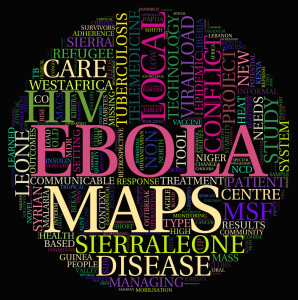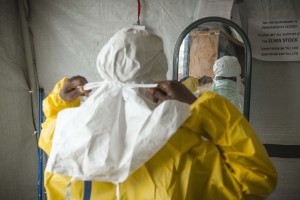 At the time of writing, the west Africa Ebola epidemic at last appears to be under control, and, as the response is scaled down, there is more capacity within Médecins Sans Frontières (MSF) to begin to appraise the evidence collected, technological approaches trialled, and lessons learned. Much of the analysis is yet to come—the work that will be presented at the 2015 MSF Scientific Day on 7 and 8 May is an early snapshot across some of the most important areas of uncertainty in the response.
At the time of writing, the west Africa Ebola epidemic at last appears to be under control, and, as the response is scaled down, there is more capacity within Médecins Sans Frontières (MSF) to begin to appraise the evidence collected, technological approaches trialled, and lessons learned. Much of the analysis is yet to come—the work that will be presented at the 2015 MSF Scientific Day on 7 and 8 May is an early snapshot across some of the most important areas of uncertainty in the response.
The MSF Scientific Day, now in its 12th year, aims to connect audiences—across countries, organisations, specialties, and disciplines—to promote debate on the state of the evidence underpinning medical humanitarian operations. Anyone with access to the internet or a smartphone can watch online and ask questions via the MSF Scientific Day website or Twitter using #MSFsci. The posters are also available at a permanent MSF Scientific Day archive hosted by f1000 and this year we are running a poster competition—please view and vote for your favourite.
This year, the conference is taking place over two days (7 and 8 May), and is hosted in New Delhi as well as London. In addition to the auditorium delegates, we hope that our virtual audience (in 2014 over 2200 people in over 100 countries) will once again join us. The intention behind both the new event in India and the online version of the conference is to engage MSF field staff, partner organisations, and other relevant medical and policy audiences to help guide field operations, influence policy, and increase the benefit for the populations in which the research was conducted.
On 7 May, in London, the focus is on innovation—both in terms of new thinking and approaches and new technology. The keynote speaker, Kenneth Cukier, data editor of The Economist, will challenge MSF and similar organisations to embrace new data practices or face becoming irrelevant.
Session topics include mapping; new approaches to providing chronic care in response to demographic shifts and middle income country refugee crises; and innovation in extreme situations, such as environmentally challenging terrain and the demands of the west Africa Ebola response. The discussions will bring together medical, operational, and technological audiences to explore what innovation really means in a humanitarian organisation, and how best we can ensure that the right sorts of ideas are adopted to produce meaningful benefit for our patients. The panel question—”You have 1 million euros: how would you use it to foster a culture of innovation in MSF?”—has exactly this aim.
On 8 May, the conference will take place both in London and New Delhi, presenting “medical research from the frontline.” The research presented in New Delhi, conducted in settings from Pakistan to Myanmar, covers tuberculosis, HIV, sexual violence, mental health tools, malnutrition, visceral leishmaniasis, and more—often focussing on neglected populations, diseases, and issues.

In London, Ebola, not surprisingly, is on the agenda on both days. On 8 May, a panel discussion will focus on what we need to know before the next Ebola outbreak. While in his keynote, Jeremy Farrar, director of the Wellcome Trust, will address the need for a faster, leaner research model to tackle rapidly emerging public health threats, and review missed opportunities from the perspective of Wellcome’s humanitarian medical agenda. The Ebola epidemic has featured in both the 2014 and 2015 MSF Scientific Days —we hope that it will not dominate the agenda in 2016.
We also hope that Ebola will not overshadow the other important topics under discussion in London on 8 May, notably malaria, which continues to exact an annual death toll higher than all recorded Ebola epidemics combined.
We are very happy that there is a session on reproductive health—a topic often neglected by research agendas, including within MSF—covering the intersection with infectious disease, as well as the adaptation of programmes to care for survivors of sexual violence. An important presentation on improving treatment in multidrug resistant TB offers an interim way forward while waiting for new TB drugs to deliver effective regimens. And paediatric populations, again often neglected, are the focus of much of the HIV presentations, alongside the views of adult patients on the roll-out of viral load monitoring.
The MSF Scientific Day is the result of a large collaborative effort—not least from our sponsors who help promote and financially support the event—and we are very grateful for the help of all involved. Most importantly, we hope that the research and the debates this week benefit the populations where MSF works. We hope that you can join this and help ensure it is a true conference without borders.
Sarah Venis, research coordinator, on behalf of the MSF Scientific Day conference organising team. Sarah is based in MSF UK’s Manson Unit where she edits and coordinates research and related projects.
Competing interests: None declared.
